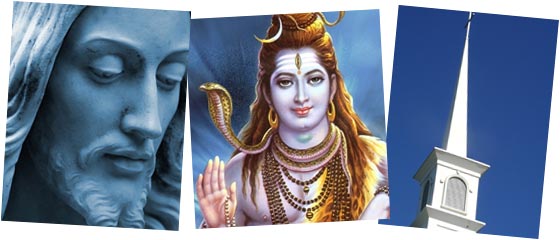 ![[Header]](../XuShared2/Line3.jpeg)

Add a Comment (Go Up to OJB's Blog Page) You Want Immortality?Entry 1147, on 2010-01-25 at 22:59:29 (Rating 5, Religion) One of the main reasons believers tell me they believe their religion is true is because of the promise of an afterlife. They say something like they would prefer to go to heaven and enjoy eternal life rather than die and meet oblivion (as most atheists believe). Of course its an absurd argument: just because something is more attractive doesn't make it more likely to be true.
There is a chance of having eternal (or close to eternal) life but its not by believing some silly bronze-age myths - its through science. I am often disgusted at how the progress of science was held back by Christianity, and I wonder where we would be today if that hadn't happened. Already human life spans have been enhanced greatly by the application of science. What would we have now if science hadn't been stifled for a thousand years by superstition?
So the irony is that Christians could have had eternal life if Christianity had never existed. In a desperate attempt at creating a pretty fairy tale to ensure an afterlife the Christians have ensured that they won't have one.
Of course, if we were a thousand years more advanced in science we would also be colonising other planets, have unlimited energy sources, be visting other stars, and be so far progressed in other areas that technology would be totally beyond the imagination of just about anyone around to day. What an opportunity has been missed.
One of the most egregious example of Christian evil of this sort is the story of Hypatia of Alexandria. I first heard this story in an Infidel Guy podcast and have researched it a bit more recently.
From Wikipedia: "Hypatia of Alexandria was a Greek scholar from Alexandria in Egypt, considered the first notable woman in mathematics, who also taught philosophy and astronomy. She lived in Roman Egypt, and was killed by a Christian mob who falsely blamed her for religious turmoil."
Christians are such wonderful people. Here's one report of how they killed her: "... waylaid her returning home, and dragging her from her carriage, they took her to the church called Caesareum, where they completely stripped her, and then murdered her by scraping her skin off with tiles and bits of shell. After tearing her body in pieces, they took her mangled limbs to a place called Cinaron, and there burnt them."
And this is just a single example of the despicable arrogance and cruelty of Christians. Do some research and you'll find thousands of similar stories. I think a case could be made to say that Christianity is the greatest disaster which has even happened in the history of the world.
There are many reasons to despise Christianity but I think the way it has destroyed progress by suppressing its opponents is one of the most compelling. So thanks a lot you bunch of mindless, superstitious fools. The past can't be changed but let's try to get things right now. Face reality and try to make it better through application of logic and facts. Forget about your primitive myths. This is 2010. Its time to move on!
 Comment 1 (2631) by Anonymous on 2010-04-01 at 20:02:15:
Sagan refers to Hypatia first on page 20 of Cosmos.
Sagan recounts Hypatia demise (Cosmos p335) at the hands of a mob of Archbishop Cyril's followers. Sagan says she was the last scientist who worked in the Great library at Alexandria. After her killing in 415 A.D. the last remnants of the library were destroyed. Sagan links this to the start of the dark ages.
I think the rise and fall of the library was a bit more complex than this reflects.  Comment 2 (2632) by OJB on 2010-04-01 at 20:22:32:
Yes, sure. I think you are probably right. History is always more complex than a book/TV series can realistically show. But I'm not quite sure what your point is here because I have never suggested that the dark ages began with, or were caused by, a single event. 
You can leave comments about this entry using this form. To add a comment: enter a name and email (both optional), type the number shown above, enter a comment, then click Add.
Note that you can leave the name blank if you want to remain anonymous.
Enter your email address to receive notifications of replies and updates to this entry.
The comment should appear immediately because the authorisation system is currently inactive.
![[Comments]](../XuShared/Comment1B.jpeg) ![[Preview]](../XuShared/Comment6B.jpeg) ![[Blog]](../XuShared/Up2B.jpeg)
|

![[Comments]](../XuShared/Comment1B.jpeg)
![[Preview]](../XuShared/Comment6B.jpeg)
![[Blog]](../XuShared/Up2B.jpeg)